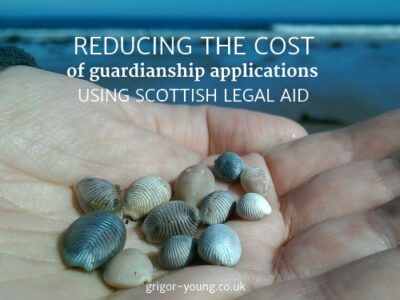A Guardianship order is a court appointment which authorises a person to act, and make decisions, on behalf of an adult with incapacity (e.g. dementia).
If you think you may need to make a guardianship application in respect of a vulnerable friend or relative, you will probably be worried about the possible cost. Should you be concerned?
In Scotland, provided the application is for a Welfare, or Financial and Welfare, Guardianship, from a financial assessment point of view, Legal Aid is automatically available from the Scottish Legal Aid Board (SLAB). The financial circumstances of the adult, or the proposed guardian or guardians, do not matter.
It is important to note that, in spite of the lowering of the financial hurdles in these cases, applicants still need to meet the standard SLAB tests of “probable cause” and “reasonableness”. In other words, you need to be able to demonstrate that the proposed Guardianship application has a sound legal basis and is likely to be granted by the court. SLAB must be seen to be prudent in the way they allow access to public funds.
We now go on to discuss the mechanics of, and interplay between, guardianship applications and legal aid in Scotland.
What is covered?
Civil Legal Aid provides help with the cost of court actions. Normally, a financial assessment of income and capital is carried out but SLAB do not require this for Welfare or Financial / Welfare Guardianship.
Civil Legal Aid covers all correspondence, meetings and telephone calls in connection with the court application. This includes:
- preparation of the court writ,
- obtaining the 2 medical reports and the Mental Health Officer’s report, which are required to support the application, and
- any charges incurred in fees to the medical professionals for the preparation of their reports.
It is important to note that Civil Legal Aid does not cover the cost of initial (pre-litigation) advice or the work required in preparing and submitting the Civil Legal Aid application.
How can initial costs be covered?
The cost of initial advice may be covered under SLAB’s separate Legal Advice and Assistance scheme (LAA).
Under LAA, a financial assessment of capital and income is required. This is by reference to the finances of the adult with incapacity, however. It does not take into account the resources of the person or persons who seek to be appointed as guardian(s).
Parameters for legal advice and assistance
To be eligible for LAA, the adult must qualify on both income and capital.
They must have income of less than £245 per week. Note that many State Benefits (including Disability Living Allowance and State Retirement Pension) are treated as “nil” income.
As regards capital (e.g. stocks and shares, premium bonds, money in bank accounts), it depends on the age of the adult. If they are under 60, their capital cannot exceed £1,716. If they are over 60, capital of up to £25,000 can be disregarded, depending on the level of the adult’s income.
As you can see, it can be quite complicated working out whether a person qualifies for LAA.
You can get further information – and do your own initial assessment of whether a person will likely qualify for LAA – on the SLAB website. Check out the Advice and Assistance Calculator and the Advice and Assistance Keycard (pdf).
If yours is not a situation where LAA will cover the pre-court-action stage of the work, your solicitor may make a charge for that work, with civil legal aid kicking in to cover the work from the point where the court action is raised. Your solicitor will be able to give you a quote for any pre-litigation work not covered by civil legal aid, before commencing that work.
Who offers legal aid?
Not all solicitors firms are willing to offer a legal aid service for guardianship applications. You should be advised of the automatic legal aid for Welfare, and Financial and Welfare, Guardianships – and given the chance, if necessary, to consult a firm who will carry out the work under legal aid.
How we can help
Assuming we have spare capacity at the time, we will undertake Guardianship applications under civil legal aid, provided the application can be made through Elgin Sheriff Court (i.e. for local adults with incapacity). We will also carry out initial work under LAA, where it is available.
If you have any questions regarding the content of this article or any aspect of our services in relation to adults with incapacity in Moray, feel free to contact us. All initial enquiries are without charge and without obligation.
You can speak to one of our solicitors by calling us on 01343 544077 or by sending us a Free Online Enquiry.


 Who Are The Best Estate Agents in Elgin Moray?
Who Are The Best Estate Agents in Elgin Moray?